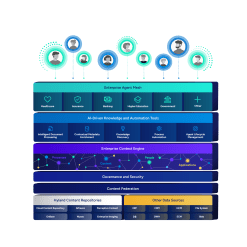The University of Naples Federico II
Italian public university improves records management and collaboration with Hyland's Alfresco platform.

Harness the power of a unified content, process and application intelligence platform to unlock the value of enterprise content.
Learn more
Explore Hyland’s solutions by industry, department or the service you need.
Overview of solutionsIt's your unique digital evolution … but you don't have to face it alone. We understand the landscape of your industry and the unique needs of the people you serve.
 Overview of industries
Overview of industries
Countless teams and departments have transformed the way they work in accounting, HR, legal and more with Hyland solutions.
 Overview of departments
Overview of departments
We are committed to helping you maximize your technology investment so you can best serve your customers.
 Overview of services
Overview of services

Discover why Hyland is trusted by thousands of organizations worldwide.
Hear from our customers
Our exclusive partner programs combine our strengths with yours to create better experiences through content services.
Overview of partners
Find resources to power your organization's digital transformation.
Browse the resource center
Hyland connects your content and systems so you can forge stronger connections with the people who matter most.
Learn about HylandWith our modern, open and cloud-native platforms, you can build strong connections and keep evolving.
 Dig deeper
Dig deeper
Reading time minutes
Italian public university improves records management and collaboration with Hyland's Alfresco platform.
The University of Naples Federico II (UNINA) has 100,000 registered students and more than 6,000 employees, including over 3,000 teachers and researchers. The sprawling university is divided into multiple schools, departments, university centers, centers of excellence, interdisciplinary centers for research and service, inter-university research centers, schools of specialization, museum center libraries, departments and administrative offices with locations throughout the territory.
Before implementing Hyland's Alfresco platform, UNINA did not have an enterprise content management solution to manage all of its hundreds of thousands of administrative documents. The university’s many departments and organizational units managed its paper documents with an Oracle-based protocol system that was not integrated with an ECM platform.
UNINA needed a way to digitize its administrative documents and manage them in a central repository to encourage collaboration between its many business units.
“Our goal is to manage and share electronic documents to improve the overall quality of service and to eventually become completely paperless,” said Clelia Baldo, technical director at University of Naples Federico II. “We needed a central repository where people could share information online and collaborate.”
The first step was to develop and launch a web app, based on an ECM engine, that was capable of managing the entire life cycle of UNINA’s back office documentation. This includes all of the documents associated with student applications and registration as well as the management of UNINA’s invoices, which are stored for 15 years.
— Clelia Baldo, Technical Director at University of Naples Federico II
The new ECM platform needed to be open and flexible enough to integrate with UNINA’s existing Oracle system architecture and policies. After evaluating several solutions, the university chose Alfresco platform based on its open architecture, scalability, overall quality and affordability.
UNINA developed an application called eDocumento in Alfresco platform for the management of its records and user profiles and to serve as a content repository. The application also provides UNINA with version control, file format management and multiple workflows. Though existing paper documents were not scanned into the platform, all newly created documents moving forward will be digital, Baldo said.
In the Alfresco platform, UNINA’s documents are digital and easy to index and search, enabling employees to share and collaborate, and all certified updates are automatic. The university’s invoices are also managed through a workflow in Alfresco platform. Metadata is collected on all documents and is shared with the back office to enable easy indexing, search functionality and collaboration between departments.
The university is taking a phased approach to gradually introduce this new digital concept and platform to its employees and student body. Over 3,000 UNINA employees are already using the Alfresco platform for document and records management.
In the first few months after implementing the solution, integration and interoperability between UNINA’s legacy systems has improved, as well as document sharing, collaboration between users and overall productivity.
The next step for UNINA is to train even more back-office users on the new platform. The university continues to increase the platform’s features and functionality, as well as add new users, with an ultimate goal of managing the entire life cycle of UNINA’s documents in Alfresco platform.
“Alfresco platform has provided us with a more organized, efficient way to run the business, and our users are very happy with the new opportunities they have to collaborate,” said Baldo.